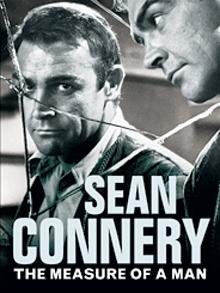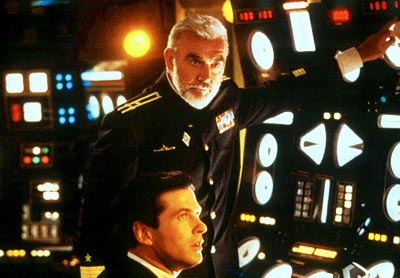|
Sean Connery - The Measure of a Man

Sean
Connery: The Measure of a Man was written by Christopher Bray and
published in 2010. The book begins by telling us that the author has no
great desire to meet Connery for real as by all accounts he's a rather
difficult and prickly character but that he is happy to write about him
because he feels entire generations of men - including him - grew up
wanting to be Sean Connery and have some of his sardonic grace and
'carnal brutishness'. He admits that Connery is somewhat private and
friends of the actor are always reluctant to speak about him so
explains his biography has been mostly compiled from interviews already
on record. It's probably not a tremendous surprise to learn that
Connery himself didn't sit down with Bray over tea and biscuits and
unburden himself! So, what do we learn about Sean Connery here that we
didn't already know? The answer is not a lot. Connery always plays
himself in films whatever character he is supposed to be, became famous
as James Bond but eventually found the role to be a pain in the arse,
loves golf, doesn't suffer fools gladly, and supports the SNP despite
never actually living in Scotland and going to great lengths to bag a
Knighthood. All this stuff we already knew and the book doesn't really
dig up much more on the man himself. What it does do though is provide
an extensive (and occasionally eccentric) overview of Connery's films
and his performances in them.
'That
f***ing truck driver,' Ian Fleming is said to have remarked about Sean
Connery after he was cast as James Bond. Well, he soon changed his
tune. Connery was taken in hand by suave Bond director Terence Young
and scrubbed up quite nicely, his elegant panther like Bond in films
like Goldfinger making Daniel Craig look like he's just spent three
days living in a dog pound. Connery's Bond is a constant in the book
with each role he takes on compared to his dapper secret agent turn,
even if it doesn't make any sense. The Man Who Would Be King was
apparently Connery poking fun at Bond (it was?) and every role was more
or less Connery playing Connery playing Bond playing whoever he was
playing in that particular film. I'm not sure this theme really makes
complete sense at times (Connery for me was far more tongue-in-cheek
and 'posh' as Bond than most other films, it was a 'performance') but
the other general theme seems sound enough. This is the view that
Connery is not a great actor and is really just Sean Connery in every
film he makes (Soviet submarine commander with Scottish accent in The
Hunt for Red October!). Connery is a great film star rather than a
great actor. Take, for example, Connery in that dreadful League of
Extraordinary Gentleman film. He must be knocking on for 75 but he
looks great, exudes charisma and is still a commanding presence at the
heart of the film. That is a film star!
One
slight problem the book has is that Bray hates James Bond but still
insists on dissecting it in a somewhat pretentious manner. 'Fleming’s
original Bond was an insufferable bore – priggish, snobbish,
public-school effete and almost gruesomely uncultured,' writes Bray,
letting it be known that he thinks the books and films are mildly
offensive cobblers (Bond is a 'jumped-up imperialist bore'). To be
honest, James Bond IS just enjoyable cobblers, a fantasy world by Ian
Fleming of what he wanted to be and then a camper and more fantastical
visual fantasy by Cubby Broccoli and Harry Saltzman. It is not
something to take too seriously or be scrutinised beyond all human
proportion. Oddly, Bray doesn't even like the Connery Bond films and
declares that the only Bond film with any merit whatsoever is On Her
Majesty's Secret Service. He does make an excellent point though when
he says that the famous scene in that film where George Lazenby's Bond
cradles his dead wife and starts sobbing could not have been done so
effectively by Sean Connery. You simply could not imagine Connery's
super spiffy Bond ever being so human. Another good point the author
makes is about how the Bond films changed the course of cinema. Not for
the better in his view.

It's
always quite interesting to move through Connery's film career beyond
Bond and be reminded of some of the films he made, both good (Time
Bandits, The Untouchables), bad (Meteor, The Avengers), and inbetween
(Outland, Medicine Man). It's absorbing too to reflect on the films
where Connery tried to move away from his Bond image, like The Hill and
The Offence, the latter a film he got made as part of his incredible
deal for Diamonds Are Forever and considered to feature one of
Connery's best performances. While Roger Moore was perfectly happy to
make Bond films forever and make self-deprecating comments about his
acting abilities, Connery always felt restricted by Bond and wanted to
more diverse and strange things (hard to imagine Roger Moore in
Zardoz!). The author here suggests it was pictures like The Man Who
Would Be King and Robin and Marian (a seventies post-modern take on
Robin Hood) that managed to break Connery loose from his Bond image and
establish himself again without the aid of a tuxedo or an ejector seat.
One thing that is obvious is that Connery's judgment isn't always
brilliant when it comes to picking and choosing which films to take
part in.
The
book tells us that he turned down both The Matrix and Lord of the Rings
because he couldn't make head nor tail of either script, instead
appearing in the very disappointing The League of Extraordinary
Gentlemen. Connery was offered 15% of the profits to play Gandalf in
The Lord of the Rings for Peter Jackson. If he had agreed he would have
made hundreds of millions of dollars! On the whole, this is readable
enough for film buffs and of interest to Bond fans even if the author
does hate James Bond. Those looking to find out anything about Sean
Connery they didn't already know though will probably be disappointed.
He's a bit chippy and plays golf. Not an awful lot beyond that. It's
not an essential purchase but a decent enough read.
- Jake
c 2011
Alternative 007
|

|


